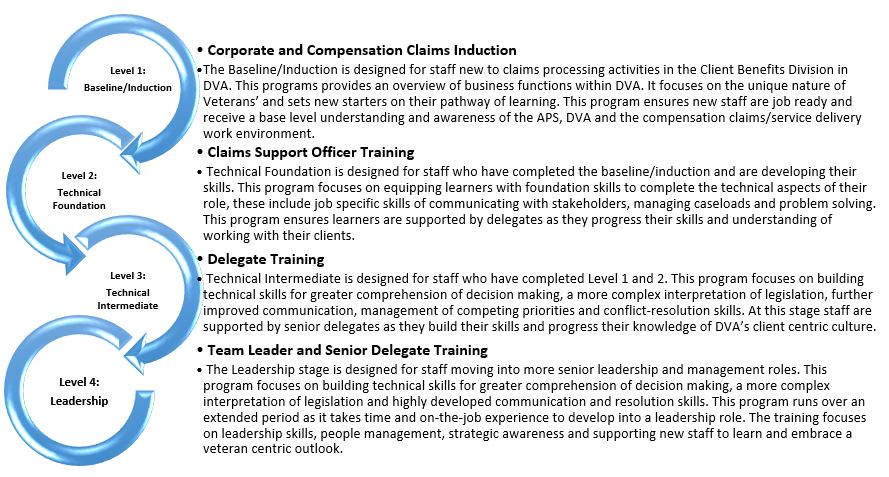Compensation Claims Learning Pathway
DVA has received a lot of interest from Veterans and Advocates to understand the distinctions between DVA’s new Claim Support Officer (CSO) and Delegate roles. This page provides information on the differences between these two roles along with a glimpse into the tailored training provided to our dedicated compensation claims staff.
Embarking on the journey to become a skilled Delegate at DVA is a continuous process of growth and learning. Our Compensation Claims Learning Pathway spans four levels, guiding our staff toward expertise in claims processing. The diagram below outlines the four levels that ensure our staff are equipped with the knowledge and expertise corresponding to their stage of training. This journey enables them to effectively support veterans and families throughout their learning journey.

Claim Support Officer Syllabus:
Compensation Claims Support Officer (CSO) training covers a range of functions including telephone and written communication with claimants to request information, give claim updates and offer support, compensation claim and client registrations, triaging enquiries, correspondence management, administrative support to a variety of compensation related programs and the assessment of Non Liability Health Care and VEA allowances.
Key topics covered in the syllabus include:
- Role of the CSO, understand what a CSO does and the expectations DVA has of this role.
- Interpreting Medical Evidence, gain an awareness of the RMA and what medical evidence is required to meet diagnostic criteria for each claim condition.
- Telephony protocols, understand how to use DVA’s telephony system Softphone and the departments committed communication standards.
- Guest speakers, to present on their area of expertise and give the trainees awareness of how they will engage with DVA’s stakeholders from the following spaces: > Advocate Representative
- Demonstration of claim processing, observing an experienced delegate to see the technical aspect of the CSO role. > Starting a claim > Requesting additional information
- Introduction to legislation, gain an understanding of the legislation DVA works under, this is an introduction and overview as Claims Support Officers will not be making decisions in relation to claims.
- Caseload Management training, training to set Claims Support Officers up for success to manage their caseload in an effective and timely manner.
- Practical Application supported by case conferencing, Claims Support Officers are able to slowly engage with claims in a supported environment, this allows them to learn the practical application of their role with a strong support system in place and raise queries in a one-to-one fashion and small group scenarios.
Delegate Syllabus:
The Delegate training includes intensive training on processing claims in line with the legislation. Training covers documenting and review of claims made by veterans (including via their advocates or representatives) seeking compensation for an injury or illness that relates to their service. Delegates make assessments of veterans’ impairment and entitlements under one or more of the Veterans Entitlement Act 1986 (VEA), Military Rehabilitation and Compensation Act 2004 (MRCA), and the Safety, Rehabilitation and Compensation (Defence-related Claims) Act 1988 (DRCA). Working within these legislative and policy guidelines, Delegates make an assessment of the level of impairment experienced by a member or veteran to make determinations about the compensation outcome that veterans may receive.
Key topics covered in the Delegate training syllabus include:
- Role of Delegate, understand what a Delegate does and the expectations DVA has of this role.
- Medical awareness and training in the following areas; > Medical Terminology > Reviewing Medical Records > Medical Investigation > Medical Advisors > Medical Evidence Summary
- Establish Diagnosis, confirming diagnoses and next steps when a diagnosis cannot be confirmed.
- Procedural Fairness, awareness of fair and unbiased decision making, evidence and natural justice.
- Policy and Procedures, learning around policy and ensuring decisions made are meeting current policy and procedures.
- Onset Date and Clinical Worsening understanding aggravation and signs and symptoms.
- Investigating Causation, Veterans’ relationship to service, legislative eligibility and applying heads of liability.
- Communication protocols, understand DVA’s committed communication standards to clients in the following areas; > Letters > Forms > Emails > Appeals and Reviews > Telephony protocols
- Guest speakers, to present on their space of expertise and give the trainees awareness of how they will engage with DVA’s stakeholders from the following spaces; > Quality Assurance > Medical Advisor
- Legislation training, this is delivered in multiple sessions to introduce the three separate legislation’s DVA works under and to develop knowledge further so delegates are able to understand the intricacies of legislation to later apply it in decision making.
- Caseload Management and Case Notes, to set Delegates up for success to manage their caseload in an effective and timely manner.
- Practical Application supported by case conferencing; Delegate trainees are able to engage with claims in a supported environment, learning the practical application of their role with a support system and ability to raise queries to experienced delegates. > Medical Investigation > Statement of Principles > STP Calculations > Onset Dates > Complex claims > Record keeping > Client communication